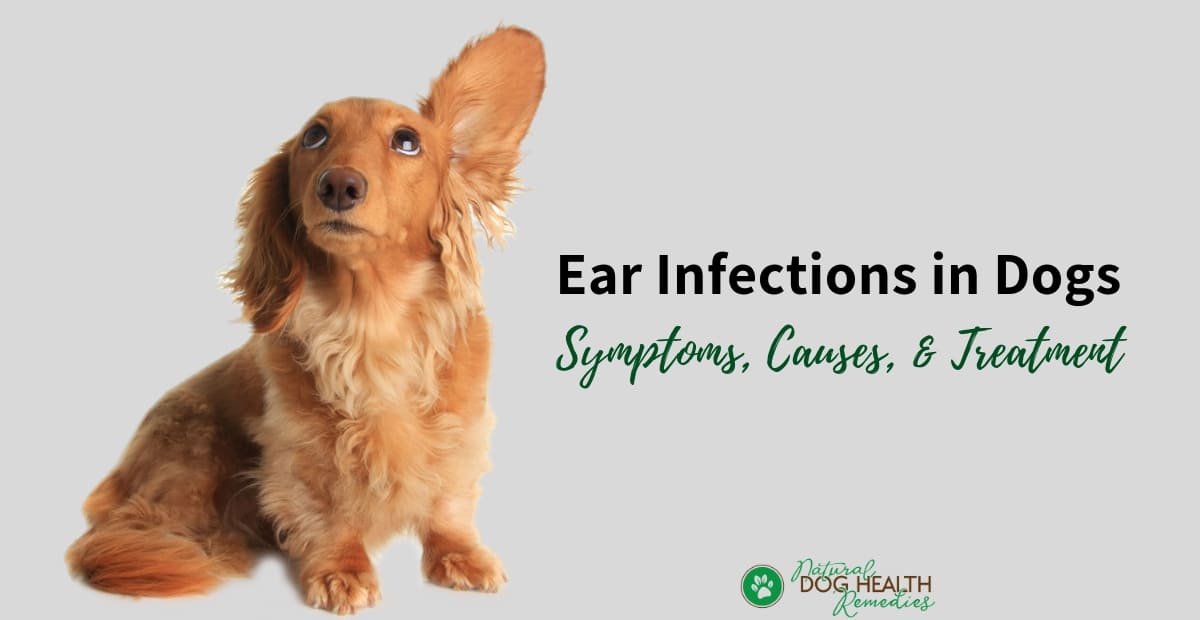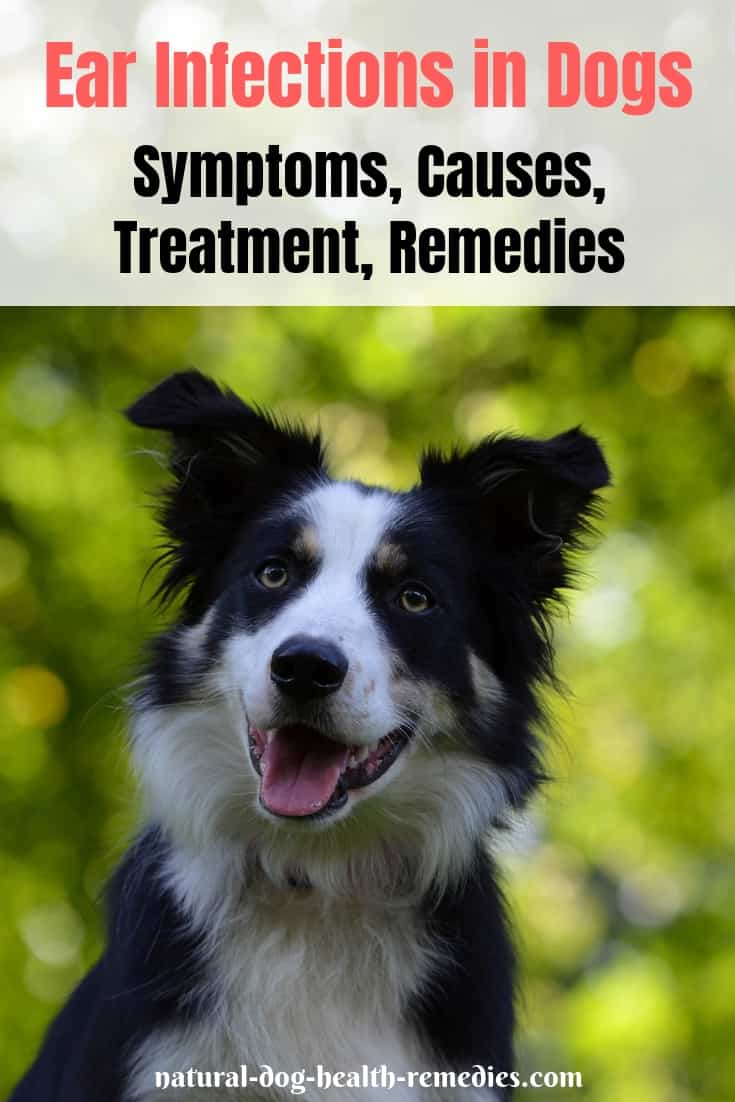Ear Infection in Dogs (Otitis Externa)

Overview
Dogs' ear canals are L-shaped. This shape helps prevent damage to the eardrum. However, because of this shape, it is extremely easy for the ears to trap moisture, debris, and parasites.
The end result? A high chance for dogs to develop ear infections.
Although some dog breeds are more likely to get ear infections than others, any dog can develop an ear infection. According to veterinarians, dog ear infections are one of the most common ailments that affect dogs every year.
A telltale sign of your dog developing an outer ear infection (otitis externa) is constant head shaking. The dog walks with his head tilted, and you will notice a bad odor coming from the dog's ears.
Prompt treatment is necessary to prevent the condition from worsening into middle ear infection or even inner ear infection, which sometimes can cause irreparable damage to the dog's hearing.
Common Causes of An Ear Infection in Dogs
Like any other diseases, prevention is the key. To prevent ear infection in dogs, we need to know the various possible causes and then we can do our utmost to eliminate such causes.
Here are some common causes:
AllergiesMany veterinarians have indicated that a majority of dog ear infections are linked to allergies (food, environmental pollutants, etc.).
Bacteria and YeastVery often, ear infections occur when bacteria and yeast on the skin work their way into a weakened ear canal. The canal may have become weakened due to a number of reasons, for example:
- The dog's ears have become wet (from bathing, or from a swim) but were not properly dried.
- The dog is suffering from allergies caused by medication or foods.
- The dog has skin allergies, such as canine atopy.
- The dog's ear has become injured from a scratch, insect bite or from various other causes.
Any of these reasons can weaken the dog ear's defense mechanisms, resulting in an ear infection.
Dog Ear MitesEar mites may also cause outer ear infections in dogs. They are more common in cats than dogs. However, some dogs seem to be extremely sensitive to mites and as such the incessant scratching may severely traumatize the affected ear.
Foreign BodiesForeign bodies such as foxtails can stick to long floppy ears while Fido is out enjoying a nice long walk. Understandably, the presence of such foreign bodies can cause irritation to the dog's ears. So when you groom your dog after a walk in the woods, be sure to check the ears, too.
If you see foxtails deep down in the ear, do not try to pull them out yourself. You may damage your dog's ear. Seek immediate help from your veterinarian instead.
Hormonal ImbalanceDeficiencies or excesses of various hormones can result in dog ear problems. One example is thyroid hormone. Dogs suffering from hypothyroidism may also suffer from recurrent ear infections.
It is important therefore to tackle the root problem (in this case hormonal abnormalities) and not just the ear problem.
Other Health ProblemsOther health problems that may cause canine ear infections include autoimmune diseases and, occasionally, tumors or polyps.
Certain Dog BreedsCertain dog breeds are predisposed to ear infections. For example,
- Dogs with floppy-ears (e.g. cocker spaniels, retrievers)
- Dogs with narrow ear canals (e.g. shar peis, chow chows)
Ear Infection in Dogs and Candida
If your dog suffers from recurring ear infections, it is possible that the underlying cause of the infections is Candida - a single-celled organism that causes yeast infections in dogs. To get rid of the recurring ear infections, therefore, the root cause (Candida) has to be eliminated.
Visit our pages on yeast infections and natural remedies for candida to learn more.


Common Symptoms of Dogs With Ear Infections
A dog with an ear infection usually shows the following signs:
- Reddening of the ear canal
- Excessive scratching and rubbing of the affected ear
- Head shaking
- Pain, sensitive, sometimes swollen ear
- Thick wax build-up
- Smelly dog ears caused by brown or black discharge from ear
- Whinning or crying when ear is touched
If your dog shows the following symptoms, it is an indication that the ear infection has gone further down to the middle or inner ear and immediate veterinary care is necessary:
- The dog holds his head still, to one side
- Opening his mouth or touching his head will cause him pain
- The dog becomes dizzy, loses coordination
- Vomiting may occur

Important!
Note that dogs with chronic ear infections may (though very occasionally) develop cancer inside the ear canal (ceruminous gland adenocarcinoma).
This is a locally aggressive tumor that, if found early, can be cured with a TECA (total ear canal ablation, which removes the entire external ear canal and the bone of the lateral side).
However, if the cancer is not diagnosed early enough, it can spread to the skull, making surgery impossible.
The signs of a ceruminous glad adenocarcinoma are often similar to an ear infection, and dogs with this cancer usually have secondary ear infections because the tumor is blocking the ear canal.
Therefore, to be on the safe side, if your dog's ear infection does not clear up relatively quickly, or if the infections keep recurring, be sure to get to the vet for a thorough check-up.
Diagnosis of Ear Infection in Dogs
Before trying any treatment, it is important that a proper diagnosis is obtained from a vet.
Make sure, for example, that there are no foreign bodies buried inside your dog's ear. Brown waxy debris and other signs of infection could be caused by bacteria, by a fungus, or by ear mites.
Without knowing exactly the underlying cause, it is like shooting in the dark and over time the infection will be sure to worsen. Appropriate treatment can only begin after a vet makes an accurate diagnosis.
Diagnosis is by physically examining the ear. Your vet will also likely do a swap by taking a sample from the ear. He will examine the sample under the microscope to look for organisms such as mites, yeast and/or bacteria.
In addition, a culture will be taken from the ear and sent to the laboratory to culture the bacteria to ascertain the exact type of bacteria we are dealing with.
Treatment of Canine Ear Infections
 Conventional treatment of ear infections in dogs involves flushing and cleaning out the ear and using topical and oral antibiotics or antifungal medications to kill off the bacteria or yeast.
Conventional treatment of ear infections in dogs involves flushing and cleaning out the ear and using topical and oral antibiotics or antifungal medications to kill off the bacteria or yeast.
Anti-inflammatories such as corticosteroids may also be used to stop the inflammation and irritations such as itching.
However, for those of us who have dogs that have had ear infections, we know as a fact that conventional medication for ear infections (i.e. antibiotics and even steroids) tends to make the problem worse.
The longer we dose our dogs with such meds, the higher the chance that the dog's body develops a resistance. Then the dog will have to be given more powerful drugs to treat the recurring infection... and so it goes.

Natural Home Remedies for Dog Ear Infections
Prevention of Ear Infection in Dogs
Here are some tips to prevent ear infections in dogs:
- Feed your dog a natural diet with proper supplements and vitamins.
- Strengthen your dog's immune system using natural supplements, such as
Only Natural Pet Immune Balance
.
- Keep water out of your dog's ears as it tends to be a breeding ground for bacteria.
- Trim the hairs inside your dog's ears.
- Make it a point to check your dog's ears once a week for signs of infection and be prepared to act quickly in case of infection.
- Clean your dog's ears regularly.
Eldredge, et al. Dog Owner's Home Veterinary Handbook 4th edition (Wiley Publishing, 2007).
C.J. Puotinen, Natural Remedies for Dogs and Cats (Keats Publishing, 1999).
M.L. Wulff-Tilford and G.L. Tilford, Herbs for Pets (Bowtie Press, 1999).
R.H. Pitcairn, The Complete Guide to Natural Health for Dogs and Cats (Rodale, 2005).





